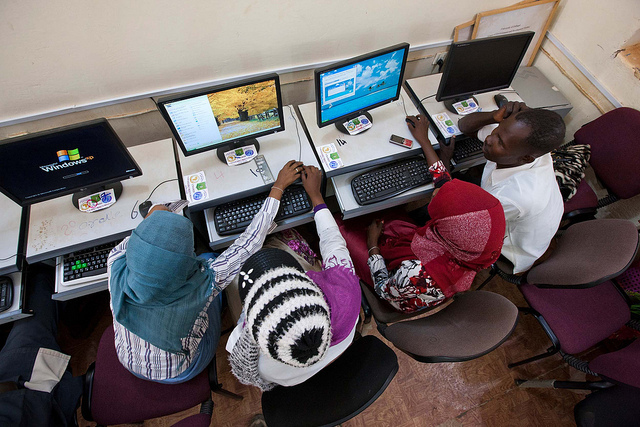
Students at the University of Geneina, Sudan. Photo by Albert González Farran – UNAMID, used under license CC BY-NC-ND 2.0.
The US government has issued a general license to amend US Department of Treasury's Office of Foreign Assets Control (OFAC) sanctions on Sudan. The general license authorizes the exportation and re-exportation to Sudan of “certain software, hardware and services incident to personal communications over the Internet.”
Under the new license, announced on January 17, 2015, Sudanese should be able to have access to, as well as purchase, personal communications technologies they were unable to use under the previous restrictions. This includes smartphones, tablets, laptops, network devices and a plethora of online services like web hosting, mobile app stores, and cloud storage services, among others.
The decision follows similar ones taken by the US government towards other sanctioned countries in recent years, including Cuba, Iran, and Syria, that aim to promote freedom of expression by enabling certain communications technologies to reach the citizens of those countries.
Jubilant Reaction
Sudanese on social media were ecstatic over the news, some joking about bidding VPNs farewell, while others were concerned about ensuring US corporations would comply with the new regulations.
Maha Elsanosi tweeted:
Good news in #Sudan for a change. Goodbye VPN, you will be missed?
— Maha Elsanosi (@MimzicalMimz) February 17, 2015
Twitter user @iYousif bid farewell to a common warning that pops up when accessing specific app stores and services from Sudan:
RIP Error 1009 — Mohabbatein (@iYousif) February 17, 2015
Twitter user @dabiggmoe noted that the fight isn't yet finished:
US partial #techsanctions lift is the 1st step. 2nd step we should push the tech companies and OTT players to comply with the new laws — MM (@dabiggmoe) February 18, 2015
But the general mood was perhaps caught by this peculiarly sentimental tweet:
ما كنت قايل نفسي هعيش لغاية الحظر الالكتروني يترفع *يبكي ويتمخت*
— MKMBHS||مَكَمْبَهَسْ (@mkmbhs) February 17, 2015
I didn't imagine I'd live to see the day the US digital sanctions on communications are lifted. *sobs and blows nose*
Long Fight
Human rights activist Dalia Haj-Omar described on Twitter the sanctions amendment as a ‘victory’, achieved by strenuous efforts by Sudanese civil society and a global network of US and non-US digital rights activists and organizations. Last year, Haj-Omar wrote about the ongoing campaign by Sudanese activists to lift the sanctions on digital communications to Sudan:
The campaign aims to educate the Sudanese public and American policy-makers about the negative impact of US sanctions on the free access to information communication technologies (ICTs) and the internet in Sudan. The launch marks a year-long advocacy effort that has included talks with US-based civil society groups and the US State Department.
A campaign to lift US digital sanctions on Sudan was launched last year by Sudanese activists aimed to shine light on how Sudanese people are affected by US sanctions on digital communications.
Journalists, political activists and human rights defenders in Sudan are particularly endangered by the worsening human rights situation in the country. Sudan has occupied the top rankings for violating freedom of expression and press freedom in human rights organizations’ freedom indexes over the past decade.
As for internet freedom, Sudan was classified ‘Not Free’ in Freedom House's Freedom on the Net index for 2013 and 2014.
The Road Ahead
In an op-Ed published on the U.S. Embassy in Khartoum's Facebook page, charge d'affairs Ambassador Jery Lanier reflected on the positive impact the exemptions will have on Sudanese people:
I believe these amendments will give Sudanese students, entrepreneurs, businesspeople, journalists, civic leaders, and others better access to the telecommunications tools they need to study, create, grow, and serve their communities. It will ease some of the difficulties in daily life faced by Sudanese people, and in a way that enhances their communications and relationship with the American people.
While a welcome step in the right direction, the new amendments are still limited in scope and the massive challenges faced by Sudanese citizens remain warranted. Young Sudanese professionals in particular are feeling increasingly isolated and unable to integrate into the global community to pursuit their innovative and entrepreneur aspirations.
“We need to push this forward now!”, Mohamed Hashim Kambal, Internet activist and coordinator of the ‘Lift US Digital Santions on Sudan’ campaign told Global Voices via Skype. Kambal cited several examples in which the sanctions still affect Sudanese citizens. “Even under the new general license, young professional engineers and developers cannot get certified by industry-established US and non-US providers and vendors from inside Sudan. Exam and certification centers can't open in Khartoum,” he explained. This has led many of these young professionals to give up on pursing their careers in Sudan, contributing to a reportedly massive exodus of skilled work force. Professionals in the fields of medicine, humanitarian development and peacekeeping face similar obstacles.
The US-based Electronic Frontier Foundation has criticized in the past what it described as US government's ‘piecemeal approach’ to the sanctions, arguing that it harms innovation and development in sanctioned countries.




3 comments